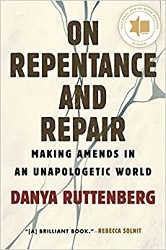
 On Repentance and Repair
On Repentance and RepairMaking Amends in an Unapologetic World
Review posted March 25, 2023.
Beacon Press, 2022. 243 pages.
Review written January 24, 2023, from my own copy, purchased via amazon.com.
Starred Review
2023 Sonderbooks Standout:
#3 More Nonfiction
I follow Rabbi Danya Ruttenberg on Twitter, and from there I subscribed to her substack, Life Is a Sacred Text. In those posts, she goes through the Torah -- now she's in Leviticus -- and talks about what it means, what it meant, and all kinds of historical thinking about the text. It's all wonderful and fascinating, and when I heard about this book, I preordered it right away. (It still took me some time to actually read it, but I was in the middle of award committee reading, so it was extra challenging.)
This book is all about addressing harm that you've done and making it right. Here's how she puts it in the introduction:
There is a model for meaningfully addressing harm -- from the daily intimate sorts of harm that manifest in personal relationships to larger wrongs perpetrated at the level of a community or culture, right up to genocide.
Of course, not every atrocity can be magically fixed, as though it never happened. But in the Jewish tradition -- rooted, specifically, in the work of the twelfth-century philosopher Maimonides -- there is a robust and sophisticated system that can help us grapple with everything from embarrassing missteps to horrific evils and do the work in our power to repair and transform. And, I believe, it can be useful for all of us -- regardless of backgrround, culture, religion or lack thereof -- here, now, today.
The book goes through this system and shows how it can look when applied to wrongs to individuals up to communities, cultures, and nations. She's right that the system is robust and widely applicable.
I've thought a lot about forgiveness in the past. The most helpful book for me about forgiveness was Forgive for Good, by Dr. Fred Luskin. This book looks at the flip side of that. What if you are the one who harmed someone else? And along with that, Rabbi Ruttenberg shows that forgiving too soon may keep someone from doing the necessary work of repentance.
Maimonides' approach is victim-oriented work. It's not just to ease the conscience of the perpetrator but to actually repair some of the harm done.
According to Maimonides, a person doesn't just get to mess up, mumble, "Sorry," and get on with it. They're not entitled to forgiveness if they haven't done the work of repair. (And they're not necessarily entitled to forgiveness even if they have.) Another human being's suffering is not magically erased because the person who caused it says that they didn't mean to do it. This is true in our personal lives, and it's also true of politicians caught saying racist things, celebrities named as sexual abusers, human resources departments that cover up employee complaints, and governments perpetrating harm against individuals or groups. Fixing damage involves taking specific steps; there's a process. We can't ever undo what happened, but we can transform the situation and ourselves.
But you can't cut corners.
In brief, Maimonides steps are:
- Naming and Owning Harm
- Starting to Change
- Restitution and Accepting Consequences
- Apology
- Making Different Choices
Please, pick up this book to learn about all the nuances of these steps and of this work. The steps sound simple, and fundamentally they are, but actually doing them can be extremely difficult.
But doing the work is rewarding! Here's how Rabbi Ruttenberg puts it at the end of the first chapter explaining the steps:
We can never undo what we have done. We can never go back in time. We write history with our decisions and our actions. But we also write history with our responses to those actions. We can leave the pain and the damage in our wake, unattended, or we can do the work of acknowledging and fixing, to whatever extent possible, the harm that we have caused. Repentance -- tshuvah -- is like the Japanese art of kintsugi, repairing broken pottery with gold. You can never unbreak what you have broken. But with the sincere and deep work of transformation, acts of repair have the potential to make something new.
Who is this book for? Here's what Rabbi Ruttenberg says, and I heartily agree:
This book is for everybody. It is based on Jewish thought, but I am very intentionally, applying these concepts to secular life and relationships. It's for Jews and non-Jews; for atheists, agnostics, and theists; for secular people, spiritual people, religious people, and for everybody in between. We've all caused harm, we've all been harmed, we've all witnessed harm. We are all always growing in our messy, imperfect attempts to do right, to clean up, to repair, to make sense of what's happened, and to figure out where to go from here. This is, I hope, a way in to the work.
I wish this book weren't so applicable in life. I wish I never saw harm done or did any myself. But the fact is, I can't imagine anyone who couldn't get important insights out of this book.
